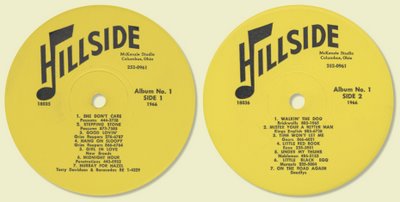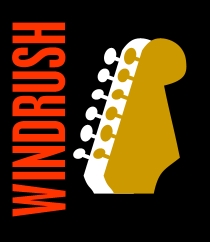
If you are a record collector or a garage band aficionado, you probably already know about the Hillside '66 compilation album. If you don't know about the Hillside '66 LP, you may find this story more than just a little interesting.
As the garage band explosion happened in the mid-60's, the dreams of teenagers to be able to play in a real band, just like their idols they were hearing on the radio and seeing on the Ed Sullivan Show, suddenly became a reality. Equipment was readily available and affordable. The songs were simple. The chords were easy to learn. And singing the songs only required some attitude and style. Long hair helped, too, of course.
On the east side of Columbus, just as in other neighborhoods in other cities across the country, garage bands were popping up everywhere. Every part of town had its bands. Walnut Ridge High School (WR), on the far east side of Columbus, was an especially fertile place for growing garage bands in 1966. Maybe it was because the suburban kids had a little more money than most. Maybe it was because Whitey Lunzar's Music Store sold guitars and amps, gave guitar lessons and was located in the middle of the WR neighborhood at Livingston Avenue and Hamilton Road. Or maybe it was because street dances were happening all over the area and local swimming pools like Holiday Swim Club, Aquamarine Cabana Club and Swimland, eager to have local bands play at their parties, provided opportunities for start-up bands to play.
Whatever the case, in 1966 the WR neighborhood could claim the Marquis, the Deadlys, the Penetrations, the Caravelles and the Crests as their own. At the time, another phenomenon was happening - the availability of local recording studios. There was Musicol, McKenzie, Rome and Coronet studios, to name a few. The possibility of actually recording a song and having it pressed on vinyl was an incredible force for local garage bands. And to make it even more enticing, the legendary local AM radio station,
WCOL, had an open playlist and eagerly played 'happening' records by local artists along side national recording artists. The Friday night countdown on WCOL almost always involved local artists - maybe the Dantes, the Fifth Order or the Rebounds, among others. For fledgling garage bands with big dreams, the situation was almost too good to be true.
McKenzie Studio, run by Larry McKenzie and located in an old house on the south side of Columbus, was an especially attractive and affordable place for a garage band to record a song or two, with the vinyl pressing being done by another local recording operation, Musicol Studio. Any band that could scrounge up a few bucks (around $50?) could record a single track at McKenzie Studio. Once there were enough tracks for an album, an LP on McKenzie's "Hillside" label would be pressed and band members could then buy copies to give to their friends, mothers and girl friends - or maybe even to a club owner in hopes of getting a gig.
During the summer of 1966, the Penetrations, the Deadlys and the Marquis each recorded one track at McKenzie Studio for an LP. The Penetrations did "Midnight Hour"; the Deadlys did "On The Road Again"; and the Marquis did "Little Black Egg". Other bands on the LP did their best renditions of the songs that were being played at street dances all around the east side: "She Don't Care About Time", "Stepping Stone", "Good Lovin'", "Hang On Sloopy", "Girl In Love", "Hurray For Hazel", "Walkin' The Dog", "Mister You're A Better Man Than I", "Time Won't Let Me" and "Under My Thumb".
Lo and behold, in the summer of 1966 there were enough tracks recorded at McKenzie Studio to press a compilation album, the now legendary Hillside '66 LP. The recording tools were primitive by today's standards and the overall sound was something akin to hearing the band in a gymnasium. Yet the recordings captured the essence of the garage bands of the day and presented that tier of local bands that never hit anywhere close to the 'big time' and probably only existed for a few months or a year. These were grass roots neighborhood garage bands at their very best, a rare audio slice-of-time showcasing what the 60's garage band phenomenon was all about.
No one seems to know how many copies of the Hillside '66 LP were pressed, but undoubtedly there were very few, maybe only a couple hundred. After all, this was a vanity or demo album, not a commercial product to be distributed for sale. The LP's were delivered in a plain white jacket - no liner notes, no pictures and no band info. Just the track listing on the record label, printed with the address and phone number of McKenzie Studio and the phone numbers for each band. Truly a time capsule.
Many years later, long after the garage bands were gone and the kids cut their hair, got jobs and raised families, the Hillside '66 LP was somehow rediscovered and brought back to life. Very quickly, selected cuts from the Hillside '66 LP began appearing on commercial (and bootleg) garage band compilations all around the world - in Germany, Australia, Japan - even though the entire Hillside '66 LP has so far never been legitimately reproduced for commercial sale. All of a sudden, copies of the few remaining original vinyl LP's were selling for prices in the $200 to $500 range and, to this day, continue to sell for those amounts, if not more.
So what does all of this have to do with Windrush? Answer: Two Windrush band members were in bands that appeared on the Hillside '66 LP. Bob McCarthy (drums) with the Deadlys doing "On The Road Again" and Mike Casey (guitar) with the Penetrations doing "Midnight Hour".
Another sidebar to this story is that almost 30 years after the Hillside '66 LP was recorded, the Deadlys and the Penetrations were finally heard for the very first time on radio on none other than WCOL, the Columbus radio station that was ground zero for local bands in the 60's. Their songs finally being heard on Columbus airwaves was a treasured moment for the band members who, as teenagers, could only dream of one day having their music played on the radio, proving once again that rock 'n' roll never dies.
And the spirit of the 60's lives on.
Note: The Marquis (original members Steve Jones and Mike Kinnett) are also back together once again and playing around town, this time as the
Marquis66.
 The full band was in the basement for practice this morning. The focus today was "Call Me", another gem by Mike Casey. Mike added a minor change to the song and the rest of the band kicked in with some minor tweaking, including a short drum break and a touch of Rickenbacker 12-string in a couple of transition spots. We recorded a rough demo of the song on ADAT, adding a tracking vocal later. The core of the song is there, although we are still giving some thought to how best to end the song. It looks like we will end the song with back-and-forth guitar solos that eventually fade out.
The full band was in the basement for practice this morning. The focus today was "Call Me", another gem by Mike Casey. Mike added a minor change to the song and the rest of the band kicked in with some minor tweaking, including a short drum break and a touch of Rickenbacker 12-string in a couple of transition spots. We recorded a rough demo of the song on ADAT, adding a tracking vocal later. The core of the song is there, although we are still giving some thought to how best to end the song. It looks like we will end the song with back-and-forth guitar solos that eventually fade out.




